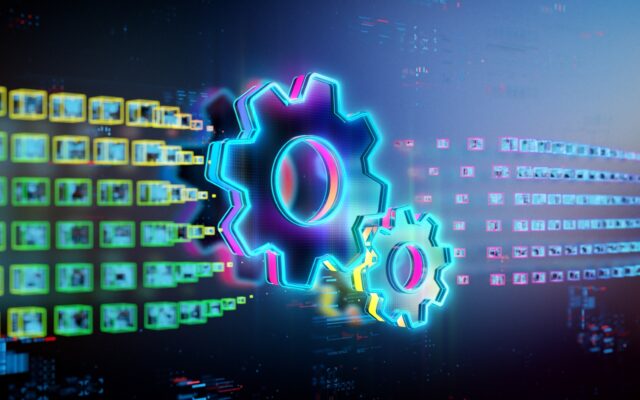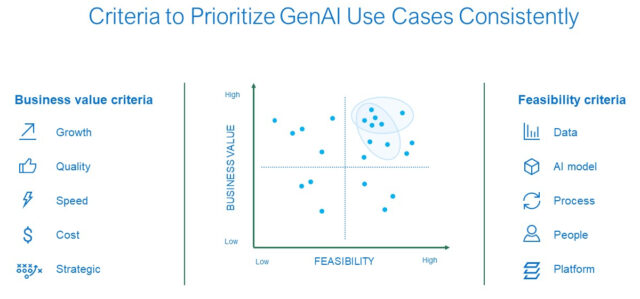Companies in every industry are enthusiastic about the potential impact generative AI (GenAI) can have on their businesses. Everyone wants to get started quickly, but a scattered approach, with different functions and business units embarking on individual projects, will not lead to the best outcomes.
A systematic approach helps assure that you’re maximizing outcomes by leveraging economies of scale, developing skills across your team, standardizing on a limited number of AI model types, platforms and infrastructure and harvesting learnings.
We address this systematic approach with the Dell AI Factory. In this blog, we’ll provide an overview of best practices for implementing your AI Factory, highlighting key ways you can accelerate outcomes and maximize business benefits.
Assess Business Value and Technical Feasibility to Prioritize Use Cases
Think about your business challenges first. In which areas can GenAI have the greatest business impact? Ask business leaders to explore use cases that can be leveraged by generative AI to enhance revenue growth, increase productivity and efficiency, speed up cycles and improve quality or customer experience.
As business leaders and IT professionals collaborate to identify high-value use cases, it’s almost certain they will uncover far more use cases than the organization has resources to pursue. They must pare down the list of use cases.
When Dell Technologies put together its own list of AI and GenAI use cases with high business value, hundreds were identified. Dell Services experts helped Dell’s IT team to prioritize use cases by plotting them by business value against technical feasibility. They further narrowed the list by grouping use cases into “clusters” based on common patterns, such as similar users, similar datasets or common models. This resulted in a manageable number of high priority clusters.
Dell AI services experts bring the skills, repeatable methodologies and purpose-built tools to work with you to build a robust GenAI strategy and prioritize your use cases.
Prepare Your Data
The next step is to identify and prepare the datasets that will be used by AI models for your prioritized use cases. Has the data been discovered and collected? Have invalid values been removed and missing values added? What about data labeling and enrichment? Privacy and security?
Organizations that haven’t yet performed data preparation and management activities will need to devote resources to getting their data in shape. Effective data management and engineering makes it easy for AI teams to establish consistent data services across GenAI use cases.
Dell’s view is to bring AI to your data, rather than defying data gravity to bring all the data to the AI system. A modern data lakehouse with secure, federated querying can access data in place, providing a single point of access to all data across the enterprise and a unified stack for GenAI, AI, ML and BI workloads. Our services professionals are experts in helping you integrate your data with AI models.
Accelerate GenAI with Solution Engineering, Developer Tools and Scalable Architecture
As we said at the beginning of this post, companies should focus on the opportunities to create business value from generative AI. You don’t want to spend your time and effort experimenting with myriad combinations of networking, storage, servers, platform software and AI developer environments. With Dell solution engineering, much of this work is already done for you.
Dell is investing heavily in solution engineering to ensure software and solutions from Dell AI Factory ecosystem partners work well with Dell AI infrastructure so you can focus on delivering business outcomes instead of infrastructure testing. Over 340,000 solution engineering hours have been invested in the design, development and validation of these AI solutions.
Dell Services AI professionals leverage this solution engineering to provide tested and proven configurations that reduce deployment time and risk, optimize infrastructure resources and scale to thousands of nodes with support for massive amounts of your unstructured data, wherever it lives.
It all adds up to confidence in deploying AI models in your enterprise IT environment.
Choose Model Types that Balance Performance, Risk and Cost
With an understanding of your use cases and the data required, you can determine the best model type to achieve the right results with the right balance of performance, risk and cost. Ideally, you want to have a small number of model types that support the use case clusters—this will keep costs lower in the present and as you grow your usage of generative AI.
Pre-trained LLMs by themselves are too general for most situations, while training a new model from scratch is very expensive and time-consuming. For the majority of use cases, most organizations are choosing either model augmentation or fine-tuning.
Retrieval-augmented generation (RAG) can be paired with a more compact language model to supply contextually aware answers utilizing an organization-specific dataset. For use cases requiring tighter controls and guardrails, the AI team might opt to invest more money and effort to fine-tune a model.
Developers need to experiment with use cases, integrating enterprise data into AI models, and deploying the finished models. You can combine RAG with a powerful Dell Precision AI-ready workstation for your AI developers to directly run LLMs. We now have new Dell Accelerator Services for RAG on Precision AI Workstations to make it easy for you to apply this exciting approach.
Make the Value Real: Adoption and Change Management
AI use cases will span functions across your organization. You’ll need a systematic way to introduce AI solutions to the teams that will be using them. Implementers need to focus on how GenAI will be used for the priority use cases, as well as human motivational, capacity and performance factors.
Training and metrics should focus on key personas. You’ll also want to measure sentiment and satisfaction on an ongoing basis.
A special callout is merited for champions and coaches. Both can make a huge difference in mentoring users as they possess knowledge of both GenAI and the workflows for the role.
Outfit Your IT and AI Ops Teams
Generative AI brings new challenges to IT and AI operations teams. They need new knowledge, skills and tools to successfully operate and manage the new systems that run your AI models. Implementing consistency and systematic processes in these areas will help them progress rapidly.
Dell offers a wide range of GenAI training courses and associated certifications to provide this new knowledge. With Residency services, a generative AI expert from Dell works alongside your team to plan and execute, as well as transfer knowledge. And GenAI managed services let you focus on expanding your GenAI portfolio while Dell professionals manage day-to-day operations.
Learn More About the Dell AI Factory
Generative AI has the potential to transform operations, boost productivity and performance and enhance trust across almost all functions in every industry. Companies cannot afford to let GenAI happen on an ad hoc basis.
The Dell AI Factory can help you gain consistency in all the stages of GenAI, which means your business will achieve more value at higher speed and lower cost. Dell Technologies offers key services to aid your teams at every stage. The Dell AI Factory will be a major focus at Dell Technologies World. We look forward to meeting you and exploring ways to apply this systematic approach to your organization.



